- Home
- M. K. Hume
King Arthur: Warrior of the West: Book Two Page 14
King Arthur: Warrior of the West: Book Two Read online
Page 14
Bedwyr had no weapons other than his strong hands, and he knew that two men stood sentry duty on the walls. Around his neck hung a narrow ribbon of leather that had once carried a flat pebble amulet, but two pieces of stick now dangled from the ends of the thong, forming an effective garotte. Although shorter than he would have liked, it could prove an effective killing tool, if surprise was on his side. The only other protection at his disposal was a thick length of half-burned wood that he had plucked from the fire inside the hall.
Indeed, Fortuna favours the brave. And perhaps the affairs of great men are truly influenced by fickle chance for, as Bedwyr reached the base of the ladder, one warrior was freeing his clothing to urinate over the wall.
Before his nerve could fail him, Bedwyr ran at the ladder with the garotte clenched between his teeth and the makeshift club shoved into his belt. As he scurried up the rough wooden rungs, he was conscious of the scuffling sounds made by his bare feet. But he ignored the telltale sounds, for speed was his only ally.
As his head cleared the coarse-sawn planks of the platform, he was already freeing his club with one hand. One of the sentries saw him coming, but before the Saxon had an opportunity to rise and turn, Bedwyr struck him hard across the temple with his club. The Celt heard and felt the sodden crunch of shattering bone. Ignoring the other man who was trying desperately to cover himself and free his sword at the same time, Bedwyr manhandled the near-dead Saxon to the floor of the tower, and then swiped viciously at his fellow. He missed, and the second guard charged at him, his mouth wide open to shout the alarm. Bedwyr managed a backhanded blow with his club across the sentry’s mouth. The man flailed his arms, reeled backwards, struck the edge of the platform with the back of his knees, and fell away into the darkness below the wall. The only sound from the desperate struggle was a distant thud and the faint clatter of dislodged pebbles as the man’s body slid down the steep ravine that protected Caer Fyrddin on three sides.
Expertly, Bedwyr broke the neck of the unconscious guard, and then stood, breathing heavily but trying to mimic the stance and nonchalance of a bored guard.
Bedwyr’s entire attack had taken less than one minute.
The minutes passed slowly as his blood cooled and he regained control of his breathing. Bedwyr was barely six feet above the ground but he was some twenty feet from the nearest warriors who were sleeping in various positions around banked fires. The distance had muffled the sounds of violent death.
Blessing his luck, and grateful for the element of surprise, Bedwyr waited until the silence was absolute. Then he wedged and lashed the body of the dead sentry so that he appeared to be standing at his post. Bedwyr’s garotte now found a new purpose, as he used the thong to tie the limp body upright, by the throat, to the rough timber.
Bedwyr armed himself with the dead sentry’s knife and sword, and peered cautiously over the edge of the parapet.
Only a curious mastiff had stirred in the hall, its superior hearing warning it that someone was awake and active. Bedwyr didn’t fear the dogs, for he fed them and was familiar to them. The large animal lifted its nose to the air, recognized the scent of a friend and wandered back towards the hall and warm straw.
Bedwyr sighed with relief, and then snaked over the edge of the tower and slid down the ladder without touching the rungs. Silently, on hard, bare feet, he reached the gate and began to lift the huge metal latch. His muscles struggled with the weight, but the well-tended wood and oiled metal rose smoothly to release the huge tongue from within its primitive frame. Fighting the gate with all his strength, he felt the whole mechanism slide free, and the gate began to turn on its huge framework.
A whisper of cloth on stone warned Bedwyr of danger, and he spun agilely to his left. A flash of light caught in the corner of his eye, and a small knife propelled by a desperate hand buried itself in the wooden gatepost where he had stood just a moment before. Without thought, and without compunction, Bedwyr withdrew the knife, stepped close to the cowled shape of his attacker, and clamped his free hand over the nose and mouth of the slight figure. A vicious twist of his wrist, and Bedwyr had his enemy’s back turned to him, where the scrabbling, impotent hands couldn’t touch him. The knife slid between his attacker’s ribs like hot metal through butter, and Bedwyr buried the blade to the hilt, and twisted it.
He released his hold and the dark form turned and started to slump. Two pale eyes widened until the whites were staring blankly up at him. Two pale hands scratched weakly at his tattered tunic and Bedwyr flinched away from the touch of the dying man. Wyrr, the sorcerer, opened his mouth as if to scream, but Bedwyr saw only a sudden rush of blood as the albino choked and fell.
Without waiting to check if the sorcerer was dead, the Celt kicked the pitifully small body out of his path, pushed on the gate and ran off into the night.
‘It’s done! It’s done! It’s done!’ Bedwyr repeated over and over again as he ran, careless of capture. Many miles lay between him and his master, King Artor. Blessedly, those weary leagues were mostly downhill.
Bedwyr fled as if the fate of the world depended on the speed of his escape. The night embraced his fleeing form, and only the more restless of the Saxon scouts stirred as the assassin sped past them on silent feet.
CHAPTER VII
GLAMDRING’S BANE
Gawayne surveyed the burning settlement with grim satisfaction. Old Nidum was neither affluent nor well-defended, but it was a Saxon settlement. Initially, Artor had chosen to ignore its existence during his march to Mori Saxonicus, knowing that the small settlement posed no strategic power to harm his force and, if circumstances decreed otherwise, action could be taken against it at a later time. Nidum had known that it was under threat, so its defenders had breathed a deep sigh of relief when the main body of the Celtic host had passed it by.
Gawayne had taken more time to achieve his task than he had initially intended. On his journey to Nidum, his troop had run into a band of thirty Saxon warriors who were travelling to join Glamdring’s force at Caer Fyrddin and, although the scouting force was relatively small, it had taken a full day of desperate hunting before the Saxon warriors were eventually annihilated. On foot, and in open country, the Saxons would normally have been no match for fifty well-trained cavalry, but Glamdring’s men had made a dash for the tree line and good cover, where they successfully defended themselves against repeated forays by Gawayne’s cavalry. Eventually, Gawayne’s losses amounted to five dead warriors and seven more wounded, before the last of the Saxons perished in a blood-soaked clearing within the thin line of trees.
If those bastards had managed to reach the forest proper before we caught up with them, we could have whistled for them for all the good our horses would have been, Gawayne thought nastily as he watched Nidum burn to the ground.
The citizens of Nidum had defended the settlement with hidden pits and traps sited around the stone-blackened Roman foundations. Gawayne gave a silent prayer of thanks to the Saxon predilection for destroying all Roman structures that were unfamiliar to them. Even though Glamdring had stripped Nidum of most of its fighting men some weeks earlier, those Saxons who remained were determined men. Gawayne was surprised to find that many native Celts were also among those who were trapped within the streets of the defeated city.
Gawayne had observed a small flotilla of fishing boats and coracles set off from the shore when his troops began to surge through the burning gates, and he wondered if those fleeing rats had been Saxon or Celt.
Celt, most likely, he decided. To their credit, the Saxons don’t usually run away from a fight.
Then, despite his lingering anger at the death of Gaheris, he had felt a moment’s admiration and pity for the Saxon race.
‘This ground is all they have, so where can they run to if they abandon their homes?’
‘You spoke, my lord?’ Gawayne’s second-in-command asked, his broad, young face puzzled and eager.
‘Drive the defenders to the water’s edge, and then offer them a
n honourable surrender. Any women and children are free to go without condition, and any males with Celtic blood are to be unharmed unless they strike a blow against us. They and their families may stay or go as they please.’
‘Are you sure that’s wise, Lord Gawayne?’ his sergeant asked, although the young man’s admiration for Gawayne’s magnanimity was written clearly on his open face.
‘Give them my terms. If the Saxons refuse them . . . then you may kill them all.’ Gawayne gave the brutal orders regretfully, for there was little glory in wholesale slaughter.
Showing a rare insight into the plight of victims of war, Gawayne ordered that the Saxon women should be allowed to take what they chose from their homes before they and their children moved to higher ground and safety. By the end of the day, many Celtic families had simply melted away into the night, continuing a long pattern of passivity that the Celtic population of Demetae had adopted years before. Of the Saxon defenders only the indomitable, white-haired Thane of Nidum and a small group of ageing warriors remained.
‘There is no honour for any of us in your deaths,’ Gawayne said as he faced them on the shoreline. ‘I’m reluctant to revenge myself on you for the actions of Glamdring Ironfist in a battle that cannot be won.’
The thane stood forth from the small band of defenders. His stature and his face were impassive.
‘We have no dreams of glory, my lord,’ he stated simply. ‘We know why Artor has come and we offer no excuses for the actions of our thane. We are old men, and our only desire is to keep the last rags of our honour. I ask that you do not make my people suffer unnecessarily, simply because they are Saxon. One day, perhaps, my people will cast aside their traditions and embrace this land as their home, but I regret that I cannot forsake the old ways, even to save my own life. I beg that you kill us in open combat, and let us die like men.’
Gawayne thought hard, his sympathy engaged by the candour of the Saxon.
Only a fool would risk his warriors in such a fashion, and Gawayne was no fool. On the other hand, the words of the old chieftain had touched Gawayne’s honour. Gaheris had been a man such as this, faithful to his oaths but not rigid in his thinking, a man who was capable of great generosity of spirit.
‘If you will not lead your people away from this place, and if you will not permit me to allow your warriors an honourable departure, then I will fight you alone, to the death, so that the spirits of you and your men go to your gods with honour.’
‘My lord, you cannot do this,’ Gawayne’s young sergeant remonstrated with his master.
‘Of course I can,’ Gawayne replied, choosing to state the obvious. ‘I’m the commander of this detachment. I can do whatever I want.’
Inevitably, Gawayne won the brief but savage battle. The old man lay dying at the water’s edge, his chest pierced by Gawayne’s dagger. As his eyes began to film in death, Gawayne asked the old man for his name.
‘I am . . . Bandur . . . Sea Changer.’ The old man took one last, shuddering breath, and died.
‘All honour goes to Bandur, the Sea Changer,’ Gawayne called, raising his sword and bloody dagger high above his head, and then the Celts slew the remaining defenders, quickly and with honour.
Gawayne gathered his men and they rode back to their encampment where the wounded awaited treatment.
The following day, Gawayne’s forces were again on the move. Artor had instructed him to patrol the foothills, and the prince was eager to obey. Campaigns like the destruction of Nidum made him feel sad and unaccountably guilty, so he was pleased to shake its dust from the hooves of his horse. His forces hunted out Saxon villagers and warned all the Demetae Celts who could be found to avoid the main centres and roads. The Celts were as dourly sullen as their Saxon masters, and Gawayne was puzzled by their passive resistance. If he had ever believed that he would be greeted like a saviour when he cleared the Saxons out of the hills, he now discovered the reality of Demetae thinking. For decades, the tribe had been pushed and prodded this way and that, without recourse to any natural justice. They had grown weary of the dreams and power struggles of strangers, and only desired the freedom to rebuild their homes and to farm their land. Gawayne’s Celts were as strange to the archaic remnants of western glory days as the alien Saxons had been, and the western Celts would give no support to any warrior who was not one of the Demetae tribe.
Gawayne understood their plight.
The day was well-advanced when an outrider heard the sound of gravel sliding from the hillside, a warning that someone was approaching from the east of Caer Fyrddin. Three horsemen were dispatched to intercept the man and bring him to Gawayne.
The Celtic warriors returned with a half-naked savage slung over the neck of one of the horses. The man was bound, hand and foot.
‘Who’s this pretty boy?’ Gawayne asked sharply. ‘Where did you find him? It’s obvious that you smelled him long before you saw him.’
‘He appeared out of nowhere, Lord Gawayne, right under the hooves of the horses as if he’d grown out of the ground. He speaks good Celt, but he’s asking to be taken to the High King. I believe he could be an assassin.’
The young Dumnonii warrior who spoke took the safety of the High King very seriously, for his tribe and the Durotriges clan both claimed Artor as their own. Gawayne grinned sardonically. Regardless of the origins of Queen Ygerne or Uther Pendragon, Artor was content to be simply Celt. In truth, Artor was more than half Roman in thinking, for his foster-mother and his arms master both stemmed from that ancient, redoubtable race.
Gawayne looked down at the filthy creature. He had been allowed to fall to the ground Stocky, rippling with muscle, but poorly nourished, the body of the man was grime-encrusted and lousy from his matted hair and beard to his calloused, black toenails.
‘Stand!’ Gawayne demanded with scant courtesy. ‘Who are you? And where are you going? If you were seeking King Artor, then you’re going in the wrong direction.’ His nose wrinkled as the stink of unwashed flesh assaulted his senses.
‘I am Bedwyr of the Cornovii, taken alive from the land to the south of Castell Collen over three years ago. I was a house slave to Glamdring Ironfist, and I’ve escaped to carry news of Glamdring’s defences and strategies to King Artor. If I became lost, it is because I’m not familiar with this place.’
Gawayne and his warriors stirred as the savage spoke, doubting that such a dirty creature could be Celt. Gawayne stared at the filthy, soot-darkened face, his distrust written plainly upon his freckled face.
‘You may doubt me if you wish,’ Bedwyr said. ‘And I suppose I would do the same were I in your shoes. If you allow me to clean myself, and if you have something else for me to wear, then you will see that what I say is the truth.’
‘The air would certainly smell sweeter if you were clean,’ Gawayne responded. ‘But why should I believe you? Ironfist is capable of sending a spy to assassinate Artor under the guise of a freed captive. You’ll have to be more convincing, my friend.’
The man stripped off his ragged tunic with his bound hands. As he straightened, wearing only an equally dirt-encrusted loincloth, the warriors could see the slave mark on his shoulder and the iron collar round his neck. Deep scarring marked the flesh around the heavy metal. Gawayne recalled Gruffydd’s scar, the twin to the cicatrice on the breast of this savage.
‘Very well, I accept that you have been marked as a slave. But how can I trust a man who stayed in Caer Fyrddin for three years, and only now escapes from our enemies to join King Artor?’
‘I bear news that King Artor must hear. As Glamdring’s servant, I heard much, and even now his men pursue me. Don’t hinder me, for he plans to attack Artor at the river mouth. Glamdring marches against Artor with a very large force, and they are determined to wipe Artor and his army off the face of the earth.’
Since Bedwyr knew the location of Artor’s camp, Gawayne calculated that his information was probably true. But a small worm of distrust still slithered its way into the thoughts o
f the prince.
‘Why should you care? Don’t you desire freedom and the chance to return to your family?’
Bedwyr spat on the earth, and anger flickered in his hazel-brown eyes. His lips parted, and Gawayne saw that his teeth were very white and sharp, as if Bedwyr had chewed on twigs and bones to preserve them.
‘I won’t rest or return to Arden Forest until the hive of Caer Fyrddin is scoured clean of the Saxon stink. For three years I’ve dreamed of choking the life out of Glamdring Ironfist, and I’ve stayed alive for the single purpose of revenge. Blood calls to blood, and a price is owed for the deaths of my friends who were burned alive near Castell Collen. When I flag in my purpose, I’ve only to remember those screams and my hatred is restored and renewed.’ Bedwyr paused for breath and his wide, muscular chest heaved with repressed emotion. ‘You may doubt me if you wish, for any sensible man would, but don’t block my path to the king. Only he can burn that filthy nest of savages. My hands can only kill so many, but the High King can slay them all.’
The manic light in the eyes of the slave, coupled with huge knuckled fists that he raised in front of his face as if he was already tearing bone from bone, repulsed Gawayne. He hated the Saxons for their treachery towards Gaheris, but no one could doubt that this man was fuelled by unhealthy lust for barbarian blood, and that nothing would deter him from his chosen path.
‘Cut that slave collar from his neck.’ Gawayne ordered crisply, his decision made.
Other than to wince when a hammer and chisel freed his throat of the constricting iron band and set his blood flowing freely, Bedwyr made no sound.
‘Take him down to the river,’ Gawayne ordered the three warriors who had discovered the slave. ‘You can give him a knife to shave his beard and shears to do something with that hair. But, just in case, you’d best keep him under close guard so that he can’t attack you with your own weapon. Let’s see how he looks when he’s clean.’

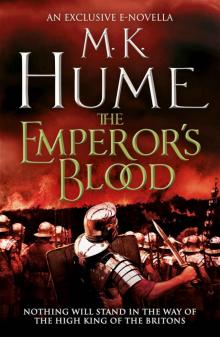 The Emperor's Blood (e-novella)
The Emperor's Blood (e-novella)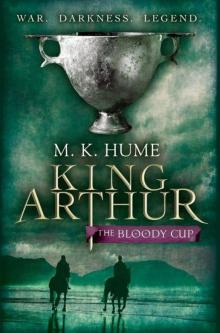 King Arthur: The Bloody Cup: Book Three
King Arthur: The Bloody Cup: Book Three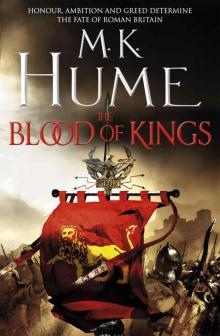 The Blood of Kings: Tintagel Book I
The Blood of Kings: Tintagel Book I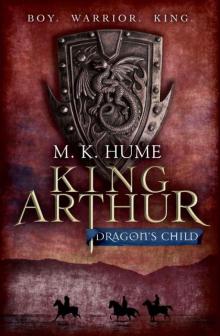 King Arthur: Dragon's Child: Book One (King Arthur Trilogy 1)
King Arthur: Dragon's Child: Book One (King Arthur Trilogy 1)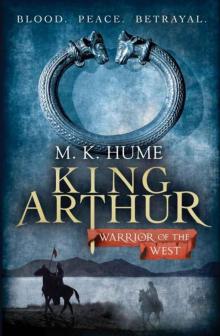 King Arthur: Warrior of the West: Book Two
King Arthur: Warrior of the West: Book Two The Storm Lord
The Storm Lord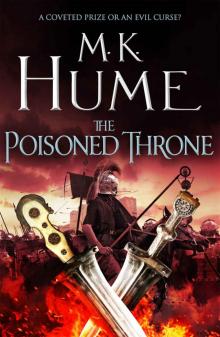 The Poisoned Throne: Tintagel Book II
The Poisoned Throne: Tintagel Book II![M. K. Hume [King Arthur Trilogy 04] The Last Dragon Read online](http://i1.bookreadfree.com/i2/04/07/m_k_hume_king_arthur_trilogy_04_the_last_dragon_preview.jpg) M. K. Hume [King Arthur Trilogy 04] The Last Dragon
M. K. Hume [King Arthur Trilogy 04] The Last Dragon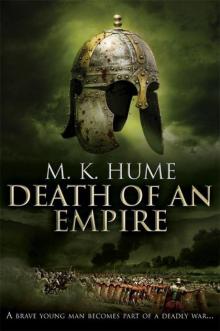 Prophecy: Death of an Empire: Book Two (Prophecy Trilogy)
Prophecy: Death of an Empire: Book Two (Prophecy Trilogy)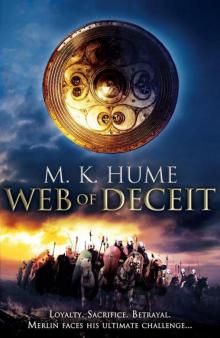 Prophecy: Web of Deceit (Prophecy 3)
Prophecy: Web of Deceit (Prophecy 3)